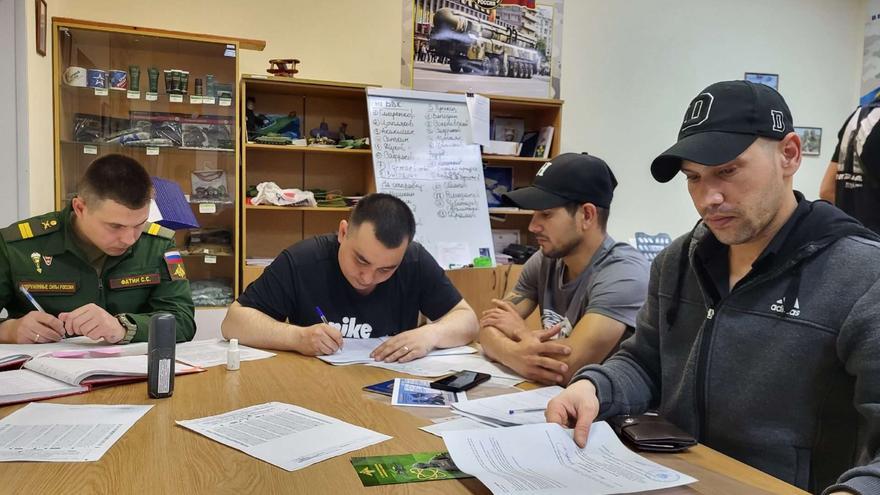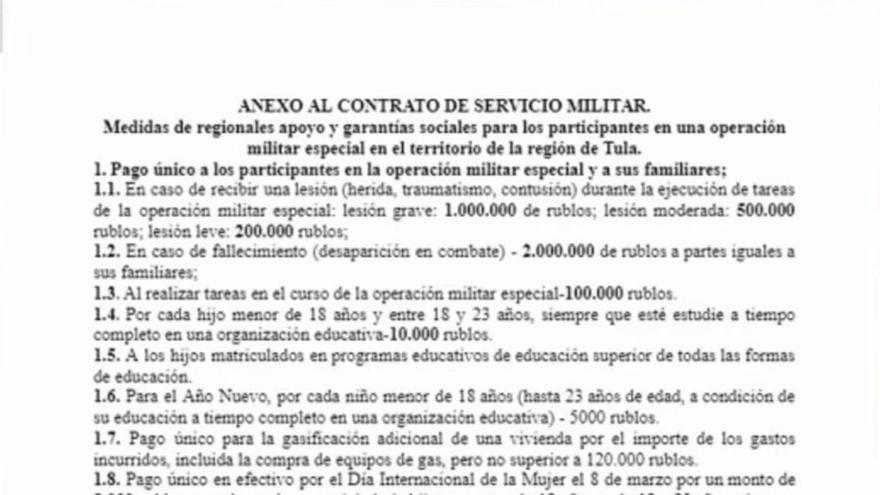
![]() 14ymedio, Madrid, 15 September 2023 — The case of the Cubans recruited to fight alongside Russia in the war in Ukraine continues to be talked about and on Thursday displayed the complicated game of juggling that Havana maintains to please Moscow without provoking the anger of the United States and, above all, of the European Union, with whom it maintains good relations.
14ymedio, Madrid, 15 September 2023 — The case of the Cubans recruited to fight alongside Russia in the war in Ukraine continues to be talked about and on Thursday displayed the complicated game of juggling that Havana maintains to please Moscow without provoking the anger of the United States and, above all, of the European Union, with whom it maintains good relations.
Cuba’s ambassador to Russia, Julio Antonio Garmendia Peña, told the state agency RIA Nóvosti: “We have nothing against Cubans who just want to sign a contract and legally participate in this operation with the Russian Army. But we oppose illegality and these operations, which have nothing to do with the legal sphere.”
The diplomat explained that the detainees linked to the alleged network that was dedicated to recruiting Cubans are all citizens of the Island, “bad people who, relying on important issues like a military operation and the relations between our countries, want to earn money, put bills in their pockets and engage in illegal activities.” And he said: “Swindlers and bandits are everywhere.”
Hours later, his boss, Foreign Minister Bruno Rodríguez, amended the words of his subordinate and reaffirmed “the unequivocal and invariable position of the Government”
Hours later, his boss, Foreign Minister Bruno Rodríguez amended the words of his subordinate and reaffirmed “the unequivocal and invariable position of the Government,” which, “according to national legislation, is contrary to the participation of Cuban citizens in any conflict, against mercenarism and against human trafficking.”
International law recognizes the difference between the mercenary, who participates in the armed conflict of a country that is not his own as part of a group of fighters or private agency in exchange for a salary, and the volunteer, who enlists in the foreign army on his own.
Cuba is obliged, as a signatory of the Hague Convention, to comply with Article 4, which requires States to “prevent the formation of mercenary groups in their territory in order to intervene in an armed conflict before which they have decided to remain neutral,” while it cannot be held responsible “when individuals cross the border of their own volition to offer their services to the belligerents.”
However, the discourse of the Cuban ambassador in Moscow about the difference between volunteers, “legal,” and mercenaries, “illegal,” doesn’t fit into the official discourse of Havana, which tries not to irritate the United States and the European Union.
These issues, which seem to be only in the legal texts, took the forefront this Thursday when the alleged capture of a Cuban by the Ukrainian Army was revealed. According to Telegram, a group of Latin Americans fighting on the Kiev side, a self-styled Bolivar Battalion, claimed that a Cuban man who, apparently, was in a Russian Army outpost, had been arrested during an operation.
If the young man is considered a volunteer and, therefore, a member of the Russian Armed Forces, the status of combatant and prisoner of war will be applicable to him, which grants a certain degree of protection that a mercenary does not enjoy, exposing the latter to serious reprisals.

In the midst of this situation, the Cuban influencer living in Miami, Alexander Otaola, made public in his program the alleged contracts signed by citizens of the Island to join the Armed Forces. The presenter described those who travel to Russia for combat as volunteers, although not in a legal sense, since it is the Cuban Government that attracts these individuals and organizes their participation. They, for their part, accept the proposal for the multiple benefits they receive, according to the documents exhibited.
Although Otaola reproached in particular the European leaders who don’t acknowledge the existence of those texts that are in their possession, there were no surprises in terms of content, since they are in line with what was announced by Vladimir Putin in his decree to recruit soldiers in exchange for different benefits, among which Russian citizenship stands out.
But there are other monetary specifications that include the one-time payment of 195,000 rubles for participation (about $2,000), one million (about $10,000) for serious injury and half that for a moderate one. There are also payments for family members, plane tickets at a reduced price, payment for housing, tax exemption for the purchase of a vehicle and coverage for the enrollment of children in childcare and/or school institutions, among many other advantages.
In the document there is also a questionnaire to fill out about why you have chosen to be a soldier and which contractual proposal is more attractive. The remaining pages shown by Otaola are the contract itself, establishing voluntary passage by the Army in the Tula region and the severance pay.
Otaola accused the Chancellor of the European Union, Josep Borrell, of having given Havana a wake-up call to mitigate damage after the most recent leaks and to insist on appearing harsh against mercenarism. “Borrell called his little friend from Havana and told him to say that all this was illegal and they didn’t know because they are going to force me to cut off their electricity and water,” he said ironically.
The war against Ukraine has become a problem for Cuba vis-à-vis the European Union, which unconditionally supports Kiev as part of NATO and as an independent institution through political and military cooperation. In recent months, different organizations of the Cuban opposition have relied on the pro-Russian activities of Havana to ask the EU to break its Agreement on Political Dialogue and Cooperation with Cuba. The most recent is the call of Cuba Siglo 21, which considers that the text “has not served the purpose of moving towards an open society in Cuba but rather has given billions of euros to the Cuban government to use for internal repression.”
Translated by Regina Anavy
____________
COLLABORATE WITH OUR WORK: The 14ymedio team is committed to practicing serious journalism that reflects Cuba’s reality in all its depth. Thank you for joining us on this long journey. We invite you to continue supporting us by becoming a member of 14ymedio now. Together we can continue transforming journalism in Cuba.
